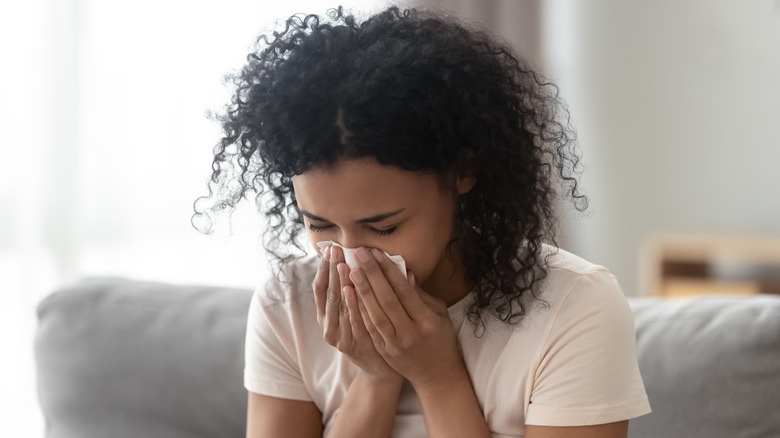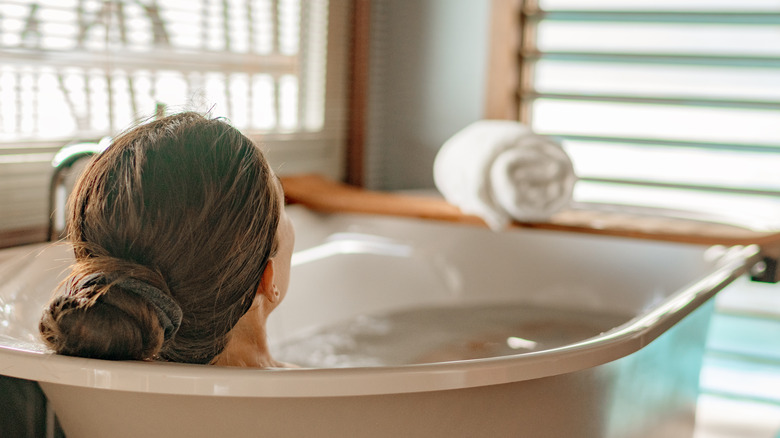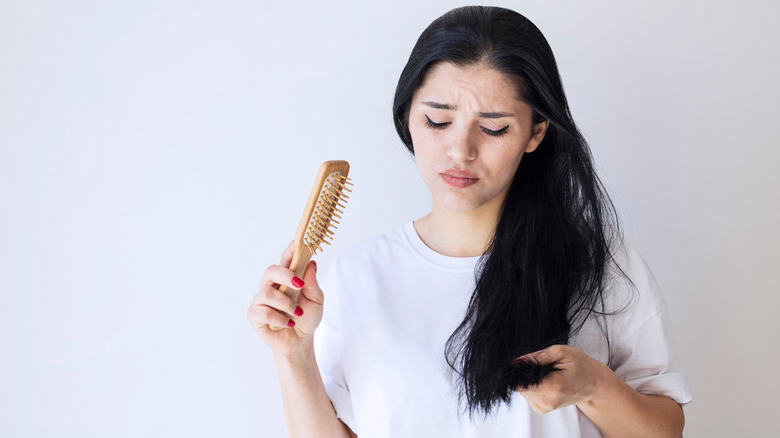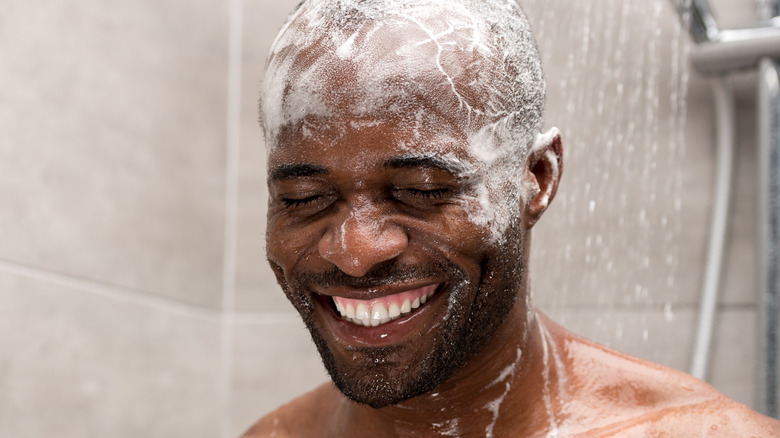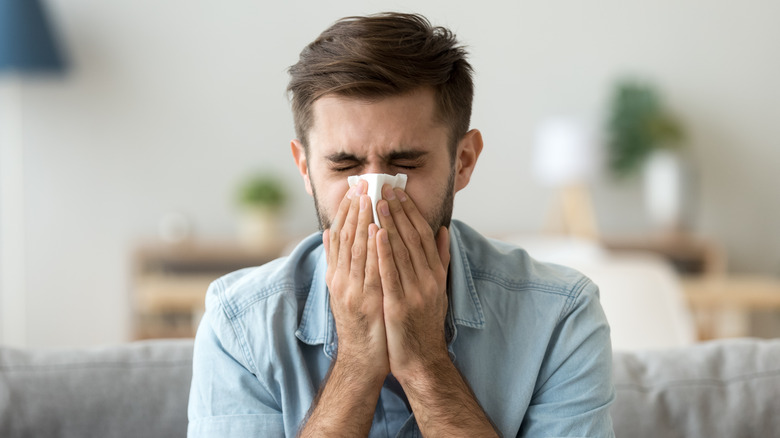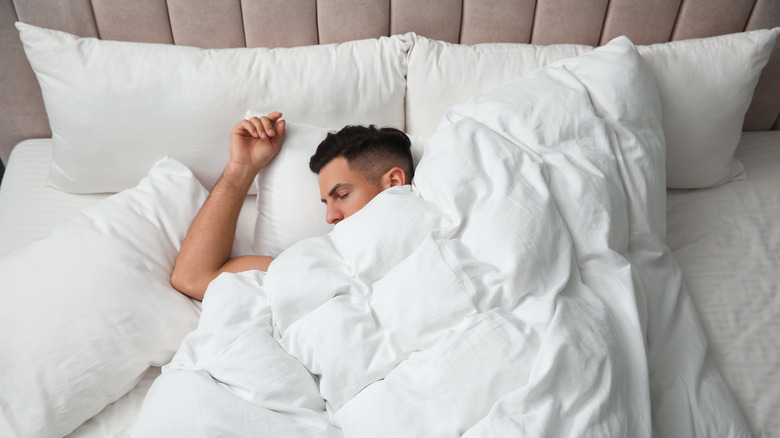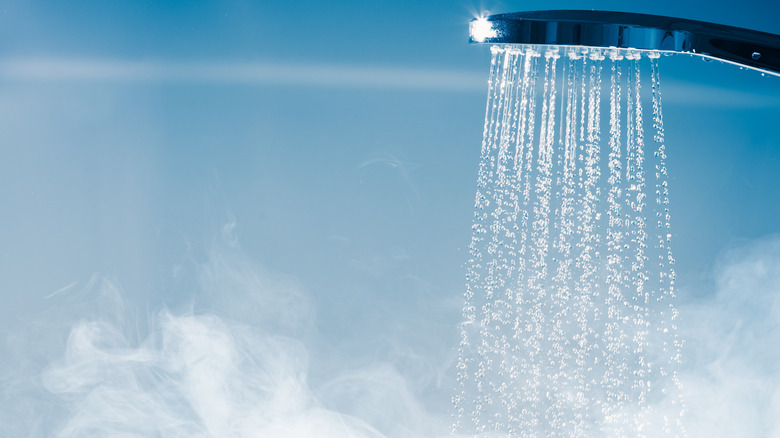What Happens To Your Body When You Take A Shower Every Day
Nobody wants to be around someone who stinks. Personal hygiene is important, but there can also be too much of a good thing. You may be surprised to learn that taking a shower every day has both pros and cons. While showers can leave people feeling fresh, clean, and rejuvenated, too many of them may lead to certain health issues (per Harvard Health).
An estimated two-thirds of people in the United States shower every day. While this may be necessary for those who exercise a lot or who work in certain types of jobs, most people don't need to shower as often as that. According to Medical News Today, showering just once or twice a week is usually sufficient — at least from a health perspective. If you are someone who likes to shower daily, you should be aware of what happens to your body when doing so — both the good and the bad.
You'll probably smell good
One reason to shower every day involves body odor. You've probably already figured out that if you don't shower often enough, you may begin to smell not-so-fresh. Body odor can impact others around you, including everyone from casual acquaintances and passersby to coworkers, friends, and even sexual partners.
In fact, Psychology Today discusses the link between smell and physical attraction: "Everyone knows what it's like to be powerfully affected by a partner's smell — witness men who bury their noses in their wives' hair and women who can't stop sniffing their boyfriends' T-shirts." Psychologist Rachel Herz further explains this phenomenon, telling the site, "Body odor is an external manifestation of the immune system, and the smells we think are attractive come from the people who are most genetically compatible with us."
Of course, this also means that not everyone out there smells good to you –– even when they take a shower every day. If you've ever had to sit next to a coworker with body odor, you know exactly what we're talking about. By the way, if this is something you are struggling with, it may be best to avoid approaching the offending party directly. Instead, ask someone in human resources to help sort things out, per The Muse.
Your skin may become dry, irritated, and itchy
When you take a shower every day, you may experience skin problems such as dryness, irritation, itchiness, cracking, infection, and allergies. "Normal skin has a protective layer of oil and a balance of 'good' bacteria that help protect your skin from dryness and germs," according to WebMD. "If you clean it too often, especially with harsh soaps and lots of scrubbing, you can strip away this layer, leading to dry, irritated, itchy skin." Cracks in the skin can then form, paving the way for both allergens and germs to enter, potentially resulting in "skin infections or allergic reactions." Does this all sound like something you'd prefer to avoid?
To prevent or alleviate skin symptoms, you may want to rethink your daily showers. If you're hesitant to give them up year-round, consider adjusting your shower schedule seasonally. For example, you could take fewer showers in the colder, drier months, and more showers during warmer weather when you are more likely to be sweaty and grimy. Healthline offers a number of showering tips to help protect your skin, including using warm water instead of hot, limiting shower length to 5 to 10 minutes, using gentle soaps and cleansers, rinsing well, and, afterward, blotting skin dry with a towel instead of rubbing.
You may find some relief from muscle aches and pains
We all know that showering after a tough workout can feel great. But should you turn the water temperature up or down? Although it may not sound as comfortable or soothing, taking a cold shower after a tough workout can help reduce inflammation and aid recovery, according to Healthline. Cold showers also offer a range of other benefits: They can wake you up, calm itchy skin, increase blood circulation, and even boost weight loss.
Don't get us wrong –– hot showers have their place, too. One advantage of a hot shower is that it can alleviate symptoms of colds, flu, and other common ailments. Thanks to the steam, you can find some relief from muscle aches, chest congestion, stuffy noses, and headaches (via WebMD). Hot showers can also be an effective form of massage, relaxing overworked muscles, per Healthline. Plus, they can even improve skin blemishes and help you sleep better at night.
You may prevent your immune system from doing its job
You may not realize that taking a shower every day can impact your body's immune function. Nevertheless, this happens because the body actually needs germs to produce antibodies and build immunity. When you shower daily, you are scrubbing away not only potentially harmful germs but also "good" bacteria and other microorganisms that could benefit your health (via Harvard Health). This is especially true when the water is hot.
On the other hand, some research indicates that showers can help boost immunity — but they should be cold. According to the Cleveland Clinic, "Researchers have found that taking icy showers may heighten your immune system and make you more resistant to illness." But if the thought of freezing water makes you cringe, take heart. Exercise physiologist Zach Carter shares that the health benefits of cold showers may not actually outweigh the involved discomfort. Instead, take fewer showers if possible, and when you do step under the tap, use warm (not hot) water.
You might just melt the stress away and improve your mood
There's nothing quite like taking a shower to wash away the day's stress and anxiety, right? But if you're looking for an even bigger mood boost, you may want to soak in a warm tub instead. A 2018 study published in Evidence-Based Complementary and Alternative Medicine examined the mood profiles of participants during two-week periods of immersion bathing versus showering. Researchers reported, "Self-assessment of health status before and after intervention every day showed health improvement after both bathing and showering interventions, although the degree of improvement was larger after the former than after the latter." They also determined that subjective health status scores were higher after bathing than showering.
If you don't have a tub, or you just prefer to stick with showers, you may want to consider some tips s to help reduce anxiety. These include using essential oil aromatherapy, placing a house plant on a shelf in the shower, turning on some feel-good music, and lathering up with luxury products (via Bustle).
Depending on the soap you use, you may be interfering with your hormones
No matter how often you take showers, the U.S. Food and Drug Administration (FDA) suggests avoiding antibacterial soaps and body washes. Instead, they recommend using plain soap and water. In part, this is because many liquid antibacterial soaps contain a concerning substance called triclosan. Research studies on animals suggest that triclosan alters the way some hormones work in the body. Further evaluation is necessary to determine its safety in humans. Beyond health safety concerns, antibacterial products also have an environmental impact. According to Columbia University, triclosan is now a contaminant in most rivers and streams, affecting both plants and animals.
If you think that antibacterial soap somehow makes you cleaner or healthier than normal soap, it probably doesn't. According to Dr. Theresa M. Michele of the FDA, "There's no data demonstrating that these drugs provide additional protection from diseases and infections. Using these products might give people a false sense of security. If you use these products because you think they protect you more than soap and water, that's not correct." So, how do you know which type of soap you are using? Antibacterial soaps and body washes are typically labeled as such, along with containing a "Drug Facts" label.
You may keep acne at bay
If you have acne, you've likely explored many ways to keep your skin clean. Per the Cleveland Clinic, "If you aren't washing, natural oils on the skin can accumulate and cause an overgrowth of pimple-causing bacteria. Dirt and dead skin can also build up and clog pores." While taking a shower every day is one way to keep your body clean, you definitely don't want to go overboard, especially when it comes to your face.
Most skin experts agree that twice-a-day face washing (morning and night) with a gentle cleanser is usually sufficient (per Verywell Health). If you wash your face more often than this, you risk stripping this delicate skin of good, healthy oils. This can lead to dry, irritated, and reddened skin, which may not feel much better than acne. Keep in mind that there may be other factors contributing to your breakouts, including bacteria and changing hormones. For personalized skincare recommendations, consult a dermatologist.
Your hair may become dry and brittle
Similar to its effect on the skin, washing every day can dry out your hair. This is considered a dermatological issue, according to an article in Health eNews, a news service from Advocate Aurora Health. Dr. Amy Brodsky explained that when you shower, your hair's natural moisturizer (called cuticle oil) is removed in the process. Afterward, many people let their hair air dry or use a blowdryer –– without ever replenishing its moisture. Unless you suffer from certain skin conditions, Dr. Brodsky recommends showering only twice a week.
Similarly, WebMD suggests shampooing two to three times a week for most types of hair. If you do choose to take a shower every day, be sure to use a leave-in conditioner to keep your hair from drying out. Other home remedies for hair include wrapping it in a towel while it dries, keeping it trimmed, cutting back on heat styling, and taking shorter showers. If you experience hair loss or breakage, be sure to consult a dermatologist (per Healthline).
You could be lowering your blood sugar
There may be a connection between taking cold showers and managing diabetes. Former medical doctor Michael Mosley told Express that cold showers can reduce inflammation, a risk factor for type 2 diabetes. Other risk factors include obesity, aging, family history, and inactivity, according to the CDC. Of related interest, a research team in the United Kingdom discovered some unexpected results in 2016 when attempting to find better alternatives to exercise for maintaining healthy blood sugar levels: Taking a hot bath can reduce peak blood sugar levels by 10% (per Diabetes.co.uk).
If you're tempted to relax in the tub instead of going to the gym, well, we can't say we recommend that from an overall health perspective. "Although these findings are interesting, we would always encourage increased physical activity and exercise as the best way to maintain good health," Dr. Steve Faulkner of the National Institute for Health Research, explained. And if the idea of taking cold showers every day has you going "absolutely no way," it may be helpful to understand that people become accustomed to cold water with repeated exposure.
You may breathe a little better
Whether you are suffering from seasonal allergies, a cold, or the flu, taking a warm shower may bring relief to respiratory symptoms. "Scientists have proven that standing in a hot shower with steam helps open airways, loosen phlegm in the respiratory system and clears out nasal passages," according to Health Shots.
Along with alleviating symptoms like chest congestion and stuffy noses, showering can help fight allergies by cleaning allergens away from your skin and hair (per Amwell for Patients). For maximum effect, Atlanta ENT Sinus & Allergy Associates recommends taking your daily shower just before going to bed. Not only can this nighttime habit keep you free of tagalong allergens like pollen and dust, but it can also lead to less congestion in the morning. Your allergy symptoms can also improve from steering clear of rough and sticky fabrics, such as wool, and environmental triggers like perfumes, scented candles, incense, some holiday decorations, smoking, and drizzly weather.
Showering in the mornings can help you wake up
It's a debate as old as time (okay, well maybe not quite that old): Should you shower in the morning or at night? Along with drinking a steaming cup of joe, early risers know that taking a shower in the morning can help wake them up. This common daily ritual can also reset messy bedheads, wash away sweat and grime from early morning workouts, and provide some time to think through the upcoming day.
Dr. Janet K. Kennedy, clinical psychologist and sleep expert, told The New York Times that while a shower can boost alertness, she recommends taking a cool shower to prevent body temperature from rising dramatically. And Dr. Gary Goldenberg, dermatologist and professor at the Icahn School of Medicine at Mount Sinai, suggests that showers at all times of the day should be kept to a maximum of five to ten minutes to avoid damaging the skin. As a bonus, shorter showers are also better for the environment.
Showering at night can help you sleep better
While morning showers certainly offer some advantages, nighttime showers may be better for people who have trouble sleeping. This is because showering before bedtime can signal to the brain that it is time for sleep (via National Sleep Foundation). Additional tips for better sleep include going to bed at a consistent time, removing electronic screens from the bedroom, and keeping your sleep environment dark, comfortable, and quiet, according to the CDC.
Another reason why showering at night can help improve sleep is discussed in a 2019 meta-analysis by Sleep Medicine Review. Researchers discovered that warm water improves blood flow to the hands and feet, lowering core body temperature. This matters because cooling down is an important part of the body's circadian rhythm (per Time). However, make sure to time your nighttime showers appropriately. Shelby Harris, director of behavioral sleep medicine at New York's Montefiore Medical Center, recommends finishing up with your shower about an hour and a half before going to bed. Taking a shower at night can also wash away the day's allergens, keep your sheets clean and fresh, and may even be more cost-effective (via The New York Times).
Your blood circulation may improve
We probably already know that healthy circulation is important. After all, your circulatory system is responsible for delivering blood, oxygen, and essential nutrients throughout the body. But can taking a shower every day help improve blood flow? A 2014 research study in the North American Journal of Medical Sciences explored the effects of hydrotherapy on various systems of the body. Among their other findings, researchers discovered that cold exposure increased blood flow to underlying tissue. In other words, taking a cold shower every day may actually improve circulation.
On the other hand, Active suggests that both cold and hot water showers may play a role in circulation. "Alternating hot and cold water in your shower can jump start your circulation. Hot water causes blood to rush to your skin. Switch to cold water to send your blood rushing to your internal organs," the site explained. "Finish off with hot water again, flushing your organs and returning blood to your skin." Other ways to improve circulation include doing more physical activity, getting massages, breathing deeply, eating a healthy diet, and adding anti-inflammatory spices to your food.
Your showering needs will probably change over time
While debating the pros and cons of what happens to your body when you take a shower every day, you may also want to consider that showering needs can change over time. For instance, some new parents are surprised to discover that newborns do not need to be bathed every day (via American Academy of Pediatrics). During the first year of life (and well into childhood), three baths a week is usually considered sufficient. Daily bathing can risk drying out delicate skin. When kids hit puberty, showering needs usually increase (via Medical News Today). At this point, daily showers may become necessary. Teenagers, who tend to be very active, often require showers after strenuous physical activities.
Most adults do not need to take a shower every day, at least not for health purposes. And as you continue to age and become less active, showering needs tend to further decrease. Some older adults may struggle with the act of showering itself, making daily showers undesirable. Fortunately, at this life stage, it is usually possible to stay clean and groomed by only showering once or twice a week. In between showers, warm washcloths or sponges can be used to freshen up.





